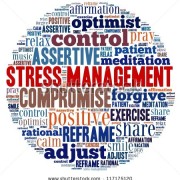HEART HEALTH – STRESS
Stress, is a normal part of everyday life and is important for us to learn and grow. However, in our world today many people are stressed far beyond the body’s ability to deal with it. Chronic stress leads to depression and possibly serious mental and body illness. High stress loads often lead to poor health and wellness choices leading to an increased risk for disease and illness.
Stress has been linked to dementia and six of the leading causes of death: heart disease, cancer, lung ailments, accidents, cirrhosis of the liver and suicide. Fear, depression, anxiety, anger, hate, resentment and worry cause a series of reactions in the body that lead to the release of cortisol and other stress hormones. Prolonged elevation of cortisol can lead to decreased sleep, insulin resistance, diabetes, weight gain, osteoporosis, cognitive impairment, damage to brain neurons, high blood pressure, cataracts, a weakened immune system and damage to the gastrointestinal tract.
In his book “The Power of Positive Thinking” Norman Vincent Peale gives numerous examples of how stress and a negative outlook on life affect our day to day health and wellness. WebMD states that stress causes American industry 300 billion annually and Statistics Canada lists our cost at 1.7 billion annually for lost work time and another 2.7 billion less to the economy as a result of an inability to balance work and life issues.
The science and the stats lead to the questions – How is your stress level? And what are you doing to control it? So many of us go blindly through our days with little or no focus on the body and what it is trying to tell us.
Full schedules that demand we go at 110% 10 to 12 hours a day at the office, a high intensity workout that drains what little energy we had left, road rage, poor and meaningless relationships with those closest to us, worry about money and the future, fear of violence and terrorism, anxiety over old age, down time that usually involves only the TV and an average of 5 to 6 hours of sleep a night – does all or some of this sound familiar.
The Heart and Stroke Foundation has combined with the Canadian Mental Health Association to create a resource that defines stress, explains the stress response, gives ideas to prevent stress, provides strategies to cope with stress and has a very complete resource guide to all the help you may need.
Click here to find




